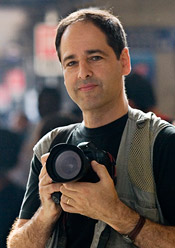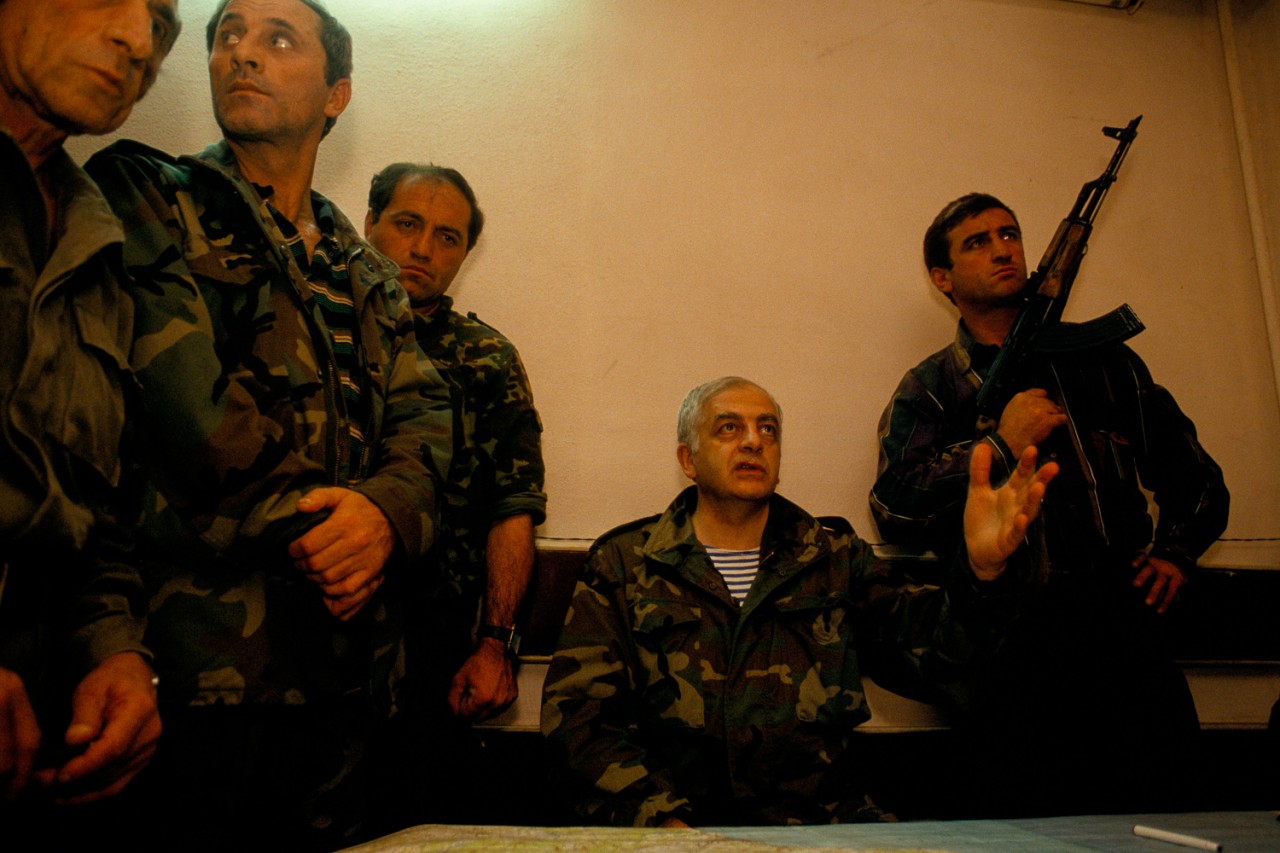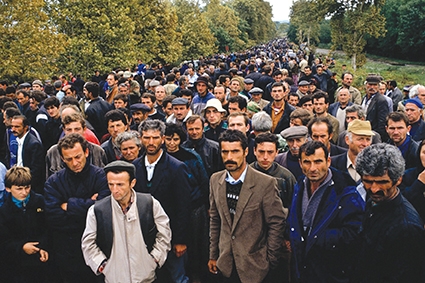Mike Goldwater on the Day Georgia “Lost” Abkhazia
EXCLUSIVE Interview
September 27, the day Sokhumi fell to Abkhazian troops, remains one of the darkest leaves in Georgia’s modern history. Other Abkhazian cities were soon to follow and tens of thousands of Georgian refugees had to embark on a perilous journey through the mountainous Chuberi Pass to make it to safety. There are a few photos and pieces of footage depicting this journey, but none as vivid and visceral as those taken by award-winning British photographer Mike Goldwater.

Goldwater, at the time an up-and-coming pro, founded a photo agency together with friends and approached the Independent Magazine, inquiring whether they would be interested in him flying over to the South Caucasus and covering the Abkhazian conflict. They duly consented and after making a couple of calls with the then-Georgian administration, he found himself on a plane to Tbilisi. Shortly after his arrival, he found a travel mate, “a Polish guy, also a photographer, named Cris,” and together they left for Sokhumi. However, as it turned out, the city fell while they were on the way, so they decided to go to the town of Ochamchire instead, believing it would become the new frontline. From there, as fate would have it, their journey was anything but mundane, with their first involuntary stop coming at the behest of none other than the first president of Georgia, Zviad Gamsakhurdia himself.
24 years on, Goldwater sat down with GEORGIA TODAY to speak publicly for the first time about his Abkhazian adventure, a tale told with a sort of jovial sadness as he looks back to what transpired in those dark days.
GAMSAKHURDIA
“We were stopped somewhere near Gali by Gamsakhurdia’s security forces, were told that we had to meet him, and then frog-marched right into his office. We took some pictures, made a small interview… But the main thing was he gave us his press-pass, so we now had two passes – one from him, one from the Tbilisi government…”
When asked what his impressions of Georgia’s highly divisive first President were, Goldwater takes a moment to ponder. He underlines he was a “cultured man, but…” and that ‘but’ is the size of elephant. We press on to get more out of him and he complies, chuckling.

Ex-president Zviad Gamzakhurdia, in military fatigues, makes a brief visit to the military H.Q. in Ochamchire. By Mike Goldwater
“It’s not only how he came across as a person, but how he behaved. How he, in a way, precipitated the disaster that was just about to unfold… The second time I saw him was in Ochamchire, the day before everybody fled. He was saying ‘we’re going to hold the town,’ giving out orders and things like that… Later that day, we spent some time with the government troops who were preparing to fight Abkhazians. And later on, I discovered that the government troops had been disarmed by Gamsakhurdia’s people. I remember asking myself ‘what’s going on?’ How come these people are squabbling among themselves in the face of impending invasion? Couldn’t get my head around it. I’m no expert, but you didn’t need to be one to figure out that it was not the cleverest thing to do”.
Interrupting, we remark that Gamsakurdia, as disputed as his legacy might be, has retained a staunch base of diminishing supporters to this day, and is widely thought of as the one who was betrayed, the rightful president of the country and not vice versa… And we get a firm rebuttal.
“Be that as it may,” he says, “it was evident that everybody was exasperated with how it was turning out; how it played right into enemy hands. It was the wrong time and wrong place for this confrontation. If not for this conflict between Gamsakhurdia and Shevardnadze, I don’t think the Abkhazian’s would have tried a landgrab the way they did”.
“When Ochamchire fell and everybody was trying to get out of there as fast as possible towards Zugdidi, with the road literally swamped with people and vehicles, some of them even without wheels, I suddenly spotted a tank trundling amongst the civilians. Gamsakhurdia’s tank. I thought – what on earth are they doing there in this crowd of fleeing people? So I took some pictures of this tank. And it was towing a luxury soviet Volga, with armed soldiers in it. One of them, when he sees me taking pictures, jumps out of the car, pulls two guns on me and says: Give me the camera! I did. He took both of my cameras and even my photographer’s vest. So I’m standing there, on the road, with no passport, no money, no camera, no film with a guy waving his guns around. And then he forced me on top of the tank. I was sitting on the tank, as he went through all my stuff. Soon Cris joined me, too. And then another photographer. Cris spoke good Russian and he told the soldiers, that we had a pass from Gamsakhurdia. Gamsakhurdia? Oh, Gamsakhurdia! – was the animated answer. So I told them my pass was in my camera vest, they found it, there was another round of “Oo Gamsakhurdia? No problem, Gamsakhurdia!” and eventually they gave me all my stuff back. So I was standing there, next to the road, having gone through this trauma, and someone, an elderly woman actually, from a nearby house who was getting ready to evacuate, came over to us and said: ‘I saw what happened to you, come and have some plum wine!’ So we went with her, drank some plum wine, and got back to normal... She was really sweet and caring and this at the moment her family was hauling their stuff out of there…”
ZUGDIDI BRIDGE
Among his photos, all of them visceral, one in particular hits hard: Georgian refugees standing on Zugdidi Bridge looking at the Abkhazian tanks rolling towards Sokhumi. We ask Goldwater to share his first-hand experience of what it was like to be there; what were the emotions of these forlorn, desperate people? What he says partly explains why his photos fell so real and vivid- this man had an emphatic link to people around him.
“Zugdidi Bridge was a key location in more ways than one. Everybody was fleeing south to Zugdidi: people knew that once they were past that bridge, they were safe. But they also knew that they were leaving behind everything they had: their houses, belongings, their life… And stepping into an unpredictable future. It was a massive exodus inside their own country. As for that photo, I remember it was early morning and the people that had flocked to Zugdidi bridge, instead of crossing, just stood there, with vacant stares, watching as Abkhazian tanks rolled across… It was a sublimely poignant moment. I stood on top of the bridge parapets to get the view of the crowd and… There was not one smiling face there. In Georgia people smile, right? It was just the moment of realization, when it dawned upon them just how much was going to be lost… What everybody would lose, because there was just no way back… And this weighed them down heavily. As it turned out, later on, some of them tried to sneak back to grab some things they’d left behind, and some of those who dared to do it had to pay with their lives…”
You can read the second part of Mike Goldwater’s Abkhazian Adventure in the next issue of GEORGIA TODAY.
By Vazha Tavberidze
Main photo by Mike Goldwater: The morning after the Abkhazian advance refugees gather on the Georgian side of the Zugdidi bridge and stare across at the Abkhazian tanks.
Related story
Mike Goldwater on the Day Georgia “Lost” Abkhazia, Part 2












